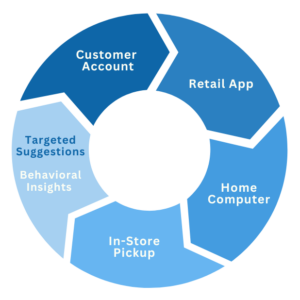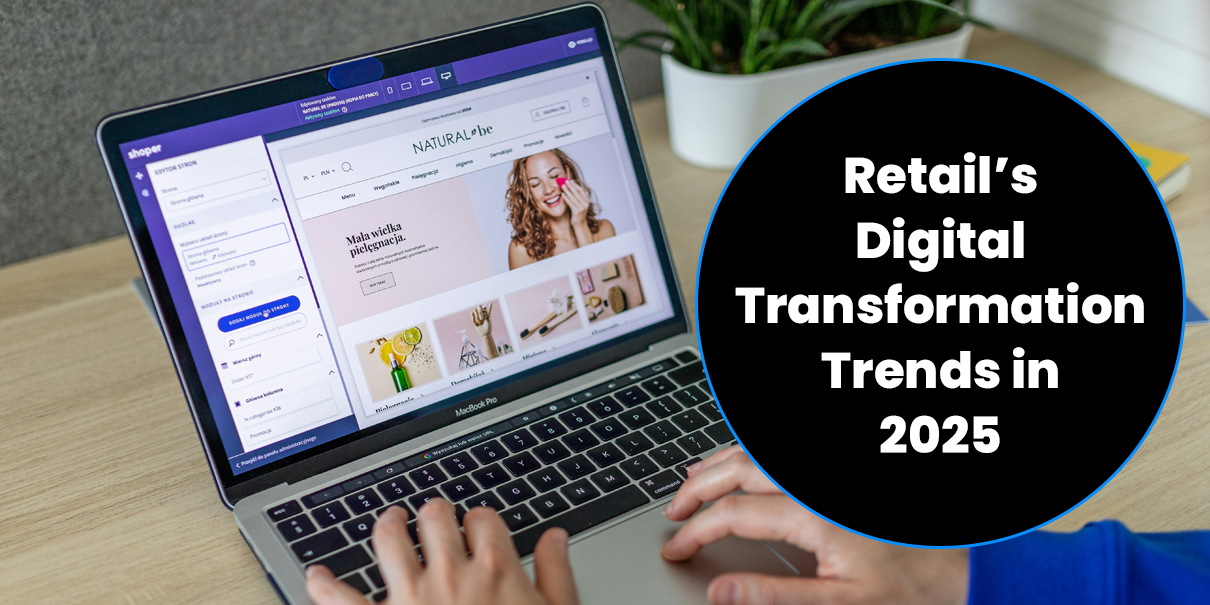More and more retailers are looking to see what’s behind all the buzz surrounding Digital Transformation. As companies investigate this trend, they’re looking to advanced technologies like AI and machine learning (ML) to upgrade their backend systems to improve operations and elevate customer experiences (CX).
In the same way that a Digital Transformation can make business processes easier and faster for employees, it can provide similar conveniences for retail customers. By implementing these solutions, brands can reduce transactional friction and make the shopping process more personalized for buyers.
The experts at 7T partner with retail clients to implement Digital Transformation in ways that provide the most value. Over the course of our experiences, we’ve noticed some retail Digital Transformation trends we think will be at the forefront of the industry throughout 2025. Some existing trends have already made positive impacts on retail businesses, while other, less common trends seem to be gaining steam over time.
In this article, we will dive into the following retail Digital Transformation trends:
- Personalized AI-enhanced shopping experiences
- Omnichannel retail
- Contactless/Cashierless payment
- Backend business process automation
- Predictive retail analytics
Let’s take a closer look at each to better understand how retail businesses are improving their operations through Digital Transformation.
AI-Enhanced Shopping Experiences With Personalization
Consumer-facing Digital Transformation strategies often leverage AI to add functionality to online and in-store shopping experiences that were previously impossible. They usually improve the customer experience by reducing friction in the purchasing process, making it easier for buyers to find products they’re looking for, and offering personalized recommendations for products they may not have thought of buying otherwise.
These added functions also heighten customer satisfaction after the sale by increasing access to customer support information and troubleshooting steps. Ultimately, Digital Transformation can improve customer lifetime value (CLV) by boosting trust and clearing the path for repeat purchases and business referrals.
| AI-Enhanced Shopping Use Cases |
|---|
| Personalized product recommendations |
| More advanced product search |
| Automated chatbots and customer support |
| Interactive product displays |
| Streamlined payment/financing |
An additional benefit of AI in CX is the ability to personalize retail experiences based on individual customer behaviors. Such insights can help brands build rapport with clients and increase the likelihood and value of their sales.
Despite the name, the ripple effect of Digital Transformation isn’t limited to eCommerce platforms and online retail: AI-powered tools can enhance CX for in-store shoppers, too. The 7T team worked with a national sporting goods retailer to optimize shop space with their product displays. We created a custom solution with an intelligent design recommendation engine to build out planograms for hundreds of retail shelf spaces across the country.
Omnichannel Retail

Beyond convenience, omnichannel experiences also incentivize the creation of customer accounts. Brands use these resources to capture data on shopper behavior, and then analyze the information for greater audience insights to provide highly targeted recommendations. This leads to easier upsells and cross-sells, and can give businesses an edge over the competition by leveraging the greatest advantage modern technology has to offer: information.
Contactless/Cashierless Payment
For in-store or online retailers, simplifying the checkout process reduces transactional friction and the number of abandoned carts. Contactless and cashierless payment options allow shoppers to load up a cart and simply tap their card or phone before walking out with their purchases. This creates a more convenient and carefree shopping environment, which typically leads to more frequent sales and higher average order values.
While online payments are, technically, always contactless and cashierless, they can still be streamlined with automated solutions – like one-click payments – that save payment information for future purchases. This allows customers to check out items with a single click, instead of first being routed to a payment information page to fill out the same details.
One-click payment options help reduce friction and can also incentivize account creation just as omnichannel retail solutions do. As a result, brands enjoy the same benefit of acquiring data on customers’ purchasing behavior to further personalize future experiences.
Backend Business Process Automation
Retail businesses expend extensive time and resources on backend processes like finance, inventory management, and more. This creates a reliance on staff for manual data entry and processing that often hinders growth, eats into profit margins, and leaves companies mired in mistakes due to human error.
To make workflows more efficient and improve the productivity and scalability of a retail business, Digital Transformation platforms can automate backend processes like the following:
| Business Process | Automation Use Case |
|---|---|
| Finance/Accounting | Automating data entry and organization in your finance and accounting departments can save countless hours otherwise spent on manual data entry and administrative tasks. Automation makes managing financial data faster, more accurate, and more cost-efficient. |
| Human Resources | AI and ML tools can automate and streamline employee education, onboarding, and many other HR tasks. |
| Customer Service | Customer service automations like AI chatbots and automated email response systems provide more prompt, informative customer service than traditional support ticket systems. |
| Inventory/Supply Chain Management | AI data automation speeds and simplifies inventory and supply chain management in similar ways to the use cases listed above. It also can automate tracking order deliveries, which benefits both internal staff and consumers. |
Business process automation is the most common use case for Digital Transformation. It’s also one of the best first steps, as it produces the most obvious and immediate benefits.
For a good example of automated business processes yielding massive reductions in time and resource expenditures, check out our HaloMD client case study, which employs an AI engine to process over 200,000 emails monthly. The time saved frees staff to focus on critical communications that actually require human attention.
Predictive Retail Analytics
Data-driven decision-making makes it easy for retailers to provide the products their customers value the most. It can also alert businesses to industry trends, enabling them to adapt sooner, maximize value, and avoid wasteful investments. Think of predictive analytics as personalized customer experience on a grand scale for your customer base as a whole.
Predictive analytics is one of the most useful applications of AI technology, as it leverages a combination of company data and historical retail customer trends. From this well of information, you can use it to generate valuable reports on where your money best serves customers, forecasts on the best products for reinvestment, and countless other valuable insights.
Master Retail Digital Transformation With 7T
At 7T, we use a “Business First, Technology Follows” approach to create AI/ML solutions for our clients across countless industries. Through our custom-built platforms, machine learning and AI technology can provide significant operational advantages with a robust ROI. Our team will audit your organization’s challenges, often by showing up on-location for a time to embed ourselves within your business and understand your needs from a first-person perspective. Then, we’ll architect a value-generating solution to transform your vital processes and meet your goals.
7T is based in Dallas, Houston and Charlotte, NC, but our clientele spans the globe. If you’re ready to learn more about retail digital transformation, contact 7T today.









